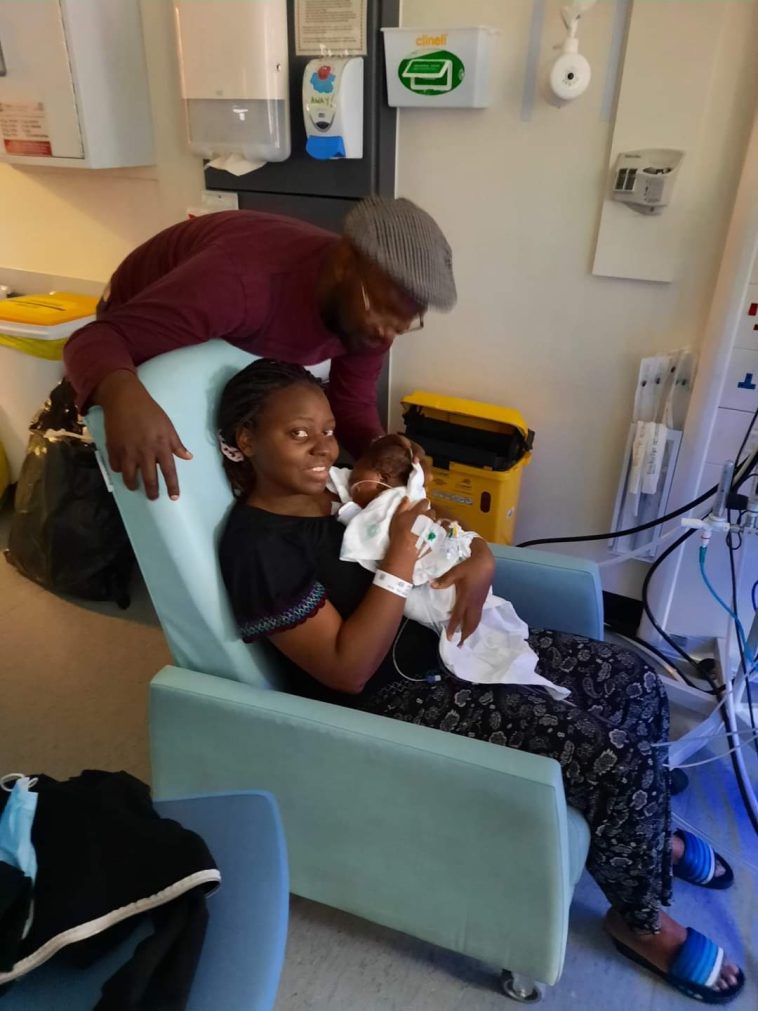I dropped Netanya off to her school. For the first time in both our lives (as far as I could recall), I was first to let go of her embrace as she hugged me goodbye. She told me something, but I didn’t really hear it. It wasn’t until I saw the quizzical look on her teacher’s face that I figured she had asked or said something to me that required a response.
“Love you Tanya,” I said, hoping that was enough to make up for whatever she had said me.
“Her mother is in labour and has been admitted to hospital,” I said to her teacher, whose expression now changed to that of complete comprehension.
I told her I might be late picking her or send a family member in my stead but would call either way.
I raced back into the waiting Uber and asked the driver to get to the hospital as fast as he could. He said he would and to be fair to him, he did try. The problem was that his passenger was a Ugandan, soon-to-be father of two with an expert knowledge of driving in Kampala, but zero experience of driving in Leeds. In my mind’s eye, the emergency I was faced with warranted forcing anyone in our way off the road, driving on the wrong side and, where necessary, pushing pedestrians off the pavement. If I’d been in Kampala, we would have arrived at the hospital in a minute or two.
But we were not in Kampala.
So he drove within the speed limit, stopped at the red lights and didn’t flash his lights at oncoming traffic or switch on the hazard lights. It was the longest drive of my life.
We arrived at the hospital a few minutes after 9am. I jumped out of the back seat and bolted towards the entrance and right through to the elevator. When I pressed the button and it didn’t open immediately, I ran to the stairs and made my way to the delivery floor. The nurses at the entrance took one look at me and figured out who I was. One shoved scrubs into my hands and pointed to the changing room, “She’s been prepped for surgery and is doing just fine,” she said reassuringly, “get changed and I’ll take you through.”
I was ready within a minute or so, but it felt like eternity. The nurse guided me to the room Diana was in and as soon as the door was opened, it was as if time stood still. There were at least five medical personnel hovering around Diana, who was lying on the operation bed looking up and very worried. She turned to the door and our eyes met. Hers were teary and I could almost feel her anxiety. I rushed to her, held her hand and tried to smile.
“Hey you,” I said, “I’m here.”
She nodded and a tear dropped down the side of her eye and into her ear. I wiped it with my free hand, stroked her hair and peeped above the screed that had been put up in front of her.
I probably should not have done so.
The thing about being in a delivery room is that although all the doctors in there do their best to project confidence, calm and a sense that everything is under control, you know at the back of your mind that things are very serious. If they were not, you wouldn’t be there. So you do this dance with them in which they act as though everything is normal and you do your best to act like you believe them. Internally though, I suspect everyone in the room was tense. Seeing the bottom of my wife’s belly slit open and layers of the skin peeled apart, with blood being constantly sucked out of the way for the surgeon that was now cutting a section of the womb struck a sense of panic and terror in me that I had not anticipated. We had been in this situation before and it felt familiar. And yet it wasn’t. With Netanya, I was there with Diana through the night and into the mid-morning when she was finally wheeled off to the delivery room. With Netanya, I had not looked. I had kept my eyes on my wife, tried to crack as many jokes as I could and even got her to sing. This time round, I had barely made it into the room in time for the surgical procedure, was still sweating and panting heavily when I sat by her side and had looked.
I looked way and down at my wife, trying my best to hide the sense of panic that had gripped me, but I think she sensed it and saw it in my eyes, even with my masked face.
“What’s wrong?” she asked, herself beginning to panic.
“Everything is fine,” I said, perhaps as much to myself as to her.
One of the doctors standing next to us greeted me and I froze.
“Oli otya ssebo,” he said with a British accent. I looked at the white, masked face from which the greeting had come and the math wasn’t mathing.
“Elinya lyange nze Ssenoga,” he continued, “neddira ffumbe.”
Now I laughed. So did Diana.
The doctor, a white man in his 50s or thereabouts, had clearly worked in or visited Uganda. I suspect he had seen me peep and panic and had decided to try and calm things down by distracting us. It worked. He proceeded to brief us on what was happening.
Shortly after Diana had been admitted, the baby’s heartbeat had dropped suddenly and therefore an emergency c-section had been deemed necessary. As it was a life-threatening situation and I was not present at the time, the decision had been made by the doctors and explained to Diana, and now it was being explained to me.
“Do you already know the sex of the child,” he asked.
“No we don’t,” Diana and I said.
“Ahhh, surprise babies are always the best!” one of the other medics in the room said.
I thanked the doctor and turned to my wife to try and distract her.
“What do you want to eat after here; katogo or a burger?” I asked
“Katogo,” she said.
“Bushera or tea?” I asked,
“Bushera”
I kept asking and she kept responding. At some point she said she was feeling some pain and tension, I told her to just look at me and focus on the conversation we were having.
After what felt like hours but was in fact a couple of minutes, I heard a weak cry.
I peeped again.
This time, I was readier. A caramel head dripping with what looked like a combination of blood and other bodily fluids was being pulled out of the gaping hole that had been cut. Soon the entire little human was out, eyes closed, ambilocal cord wrapped around his neck, legs and arms kicking.
One the doctors turned the baby so that the legs faced Diana and I, ostensibly to show us the sex. I stared back blankly, my mind completely failing to register what was going on.
“It’s a boy,” she said.
I turned to my wife, “It’s a boy,” I said, “I told you!”
And so it was that on the 17th of June 2022 at 9:33am, a son was born was born unto us, weighing a whooping 4.1kgs.
Another weak cry and then silence.
With Netanya, the doctors had allowed us to immediately hold her for a few minutes before she was taken to a table, prepped, wrapped and then brought to us again.
With this one, he was whisked away to a table in the corner and the doctors began to press his little chest with their fingers and use a nasal aspirator bulb to remove lots of fluid from his nose.
He wasn’t crying.
The doctor turned him over and rubbed him on the back. The nasal aspirator bulb again. The pressing of his little chest again.
No cry.
“Why isn’t he crying?” Diana asked
“He’s ok babe,” I said, “he’s fine.”
But he wasn’t. And although I was not a doctor, I could tell we were hanging on the cliff’s edge.
“No, God,” I thought, ‘please no”.
The rubbing, clearing of the nose and chest pressing continued for about a minute.
There was a weak cry.
“Yes Lord,” I thought, “please yes”.
More rubbing. More clearing of the nose. More chest pressing.
No cry.
After about three minutes of this, he began to consistently cry. But it was a weak cry. More like a whimper. I was called to the table and offered the opportunity to hold him. I held him to my chest and rocked him. Then I took him to Diana and showed him to her. It’s possible it lasted longer, but it really felt like a few seconds.
And then he was taken away from us and rolled way to the neonatal ward.
“He ingested a lot of meconium,” one of the doctors explained, “we are going to try to get it out of his system and get him some oxygen so as to stabilise his breathing.”
I stared at him, trying to figure out whether to ask what meconium was. I knew I couldn’t say it loud, but the first thing that came to my mind was Superman and kryptonite.
“We are going to patch you up quickly and as soon as we are done, you will be able to join him in the neonatal ward,” the doctor continued, this time addressing Diana.
And that, ladies and gentlemen, is how our son introduced himself to us. He came out swinging from the get go. Literally fighting for his life. Refusing to let his first breaths be his last. And standing on the prophetic promise of his name.
Amariah; because he was “Promised by God”
Shoroora; because he is “Set apart” for the Lord’s will
Gulumiza; because he cannot but “Adore” the one from whom life in its fulness flows
Isharaza; because he comes from somewhere and stands upon the shoulders of those that came before him.
He is our son. And he makes two today.
Happy birthday son.
This post was created with our nice and easy submission form. Create your post!





